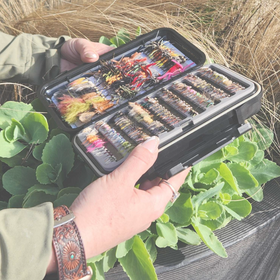Who is best suited to this destination?
This destination is best suited to anglers eager to explore a new tarpon fishery that is just coming into focus. The program features diverse fishing environments including mangroves, estuaries, reefs, and rivers, some of which are urban. Most rivers are surrounded by lush forest and mangroves with locals and their boats, however it is highly unlikely that any of them will be looking for tarpon.
Where is the operation?
Silver King Brazil operates in a vast area of northeastern Brazil: in the states of Pernambuco and Paraiba. This area is the eastern most coastal region of Brazil and the area the operation is operates is between Natal and Porto de Galinhas.
How do I get there?
To reach Silver King Brazil, you will need to fly to Recife. A driver from SKB will meet you in at the Recife airport and drive you for approximately 1 hour to the house in Porto de Galinhas. Recife is a touristy area where flights are readily available, with direct flights from Orlando, Fort Lauderdale, São Paulo, or Rio de Janeiro.
When should I go?
The main program based out of Porto de Galinhas runs from Mid-September through March and will primarily focus on the resident baby tarpon population. There are occassional opportunities from Mid-September to December where you can target large migratory tarpon and the resident baby tarpon. This program is not always a guarantee, but in some instances this specific program can be tailored to anglers, where the first three days are dedicated to targeting large fish, followed by a rest day, and then another three days focused on fishing for juvenile tarpon ranging from 6 to 30 pounds.
How will I fish?
The Silver King Brazil team operates from fully equipped boats that prioritize comfort and safety, utilizing electric motors for movement and anchoring for pinpoint positioning. Guests will cast from the boats with saltwater floating, intermediate, and sinking lines and strip flies.
Is there wade fishing?
While there are limited opportunities for wade fishing, you can enjoy some wading on the Ipojuca River. There are a few areas to hop out of the boat and enjoy some casting from the banks of the river, along the mangrove edges. But this is primarily a boat-based fishery.
Where will I fish?
Guests will target five rivers spread across these two states, each tributary with its own unique features. Guests will fish in relatively short rivers that offer diverse structures, including mangroves, open channels, sunken trees, stone points, sandbars, bridges, and more. There may also be an opportunity to fish an ocean reef depending on conditions.
How long does it take to reach the fishing grounds?
On any given day, travel times are approximately 30- to 35-minutes to reach the fishing grounds from the accommodations.
What type(s) of fish will I catch?
The primary target species for this destination is tarpon. Other incidental species including jack crevalle and snook might also be encountered.
How many fish will I catch?
The number of fish you catch will depend on your angling ability, casting accuracy, distance, and speed at which you deliver the fly to the target. It is not uncommon to have 5 to 10 good opportunities per day. Landing them is another story!
Will I see other anglers?
Yes, it is possible to encounter other anglers while spending time on the water. Because many of these locations are close to urban areas, you will always see other people but most of them will not be fishing for tarpon.
What are the guides like?
Silver King Brazil provides international fly fishing guides who possess the necessary skills, dedication, and knowledge to introduce guests to the amazing sport of tarpon fishing. The guides are proficient, polite, respectful, and all speak English.
What are the physical demands?
Be prepared to stand under the sun on hot days and cast rods ranging from 8- to 12 weights. Anglers that have good balance and casting abilities will do best. If fishing two anglers per a boat, you will have opportunities to sit down and rest at times.
Are there any special skills required?
No special skills are required, but having good casting techniques will help you reach fish that are cruising at farther distances from the boat or having the skill to make accurate casts on the mangrove-lined shores.
Does the lodge provide equipment?
Anglers are required to bring their own equipment. However, the guides will have some flies and tippet material on the boat, if needed.
What is your favorite setup for the trip?
For this trip, we recommended 9-foot fast action rods in 8- to 9-weight for the baby tarpon and 10- to 12-weight fast action rods for the larger migratory fish (if available). Weight forward saltwater floating, intermediate, and sinking lines are perfect. Anglers’ reels should have strong, sealed drag systems.
What are the top flies?
Classic tarpon flies, Clouser minnows, tarpon toads, black death, and small poppers, are popular. It is always advisable to have some all-white flies in your box. Chartreuse, tan, pink, yellow, and orange colored flies also work very well.
What are the options if weather conditions become challenging?
If extreme winds or storms occur in the region, anglers will return to the hospitality area. However, the guides will make every effort to keep you safe and provide opportunities for fishing within the mangroves if the weather allows.
What is a typical day like?
Breakfast is served between 5:00 and 5:30 AM, followed by preparations for departure at 6:15 AM. Fishing takes place from around 6:30 AM to 12:00 PM, with a lunch break from 12:00 PM to 2:00 PM. After lunch, fishing continues until approximately 5:00 PM, after which you will return to the hotel.
Is there an on-site owner, manager, or other point-person at the lodge?
The owners of the operation, Everton Pires and Guido Perillo, will serve as your guides and hosts and oversee logistics during your entire trip. There are other local guides that work with the operation as well.
Where do we eat, and what are the meals like?
Regional cuisine, including tasty fish and meat dishes, Brazilian breakfast with seasonal fruits, and fresh, endless shrimp, will be served. Silver King Brazil also offers an all-inclusive premium house with a personal chef and housekeeper. Some days, a packed lunch will be provided and enjoyed on the river.
What is the alcohol policy?
Beer and soft drinks are included. Guests are welcome to bring their own bottles of wine, whisky, or liquor.
Where do we stay, and what are the accommodations like?
The accommodations are simple, clean, and very comfortable, providing all the necessary amenities such as air conditioning, fans, hot water, Wifi, and more. The rates are based on double occupancy, with an additional charge for single occupancy anglers. The main program has guests staying in Porto de Galinhas at a private house. It is a nice beachfront home with a chef and pool. Meals will be fresh and delicious with plenty of surf and turf options.
Is there internet and/or cell service?
Guests will have access to the internet via Wi-Fi. Please check with your cell service provider for coverage in Brazil.
Are there other activities?
In addition to fishing, the northeastern region of Brazil offers a wide range of activities including city tours, beautiful beaches, natural swimming pools on the reefs, among others.
Are there any other expenses?
Gratuities for staff and guides are not included in the package. Additionally, any special requirements such as alcoholic beverages outside of beer would be an additional expense.
Do I need a visa?
Yes, starting January 10, 2024, a visa is required for Brazil.
Are there any health concerns, dangers, or annoyances?
During the summer months in northeastern Brazil, mosquitoes can be present, especially near the mangrove areas. It is recommended to bring some solid bug repellent and clothes that keep you covered. Silver King Brazil also advises guests to consult the U.S. Department of State and the Center for Disease Control websites for general travel information and guidelines for Brazil.



















